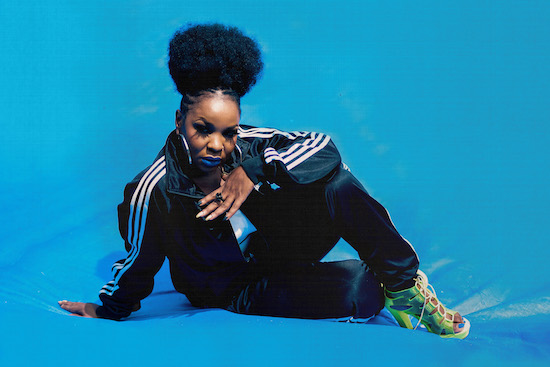Imagine: it’s June 2022 and you’re in the middle of German buttfuck nowhere, planted in a graveyard for industrial machines known as Ferropolis. A tiny wooden shack known as the Paper Stage looms over a small dirt area, where you’re dancing. You – and thirty other people – are totally in thrall to ‘MC Yallah’ Mbidde Gaudencia, one of Uganda’s finest hip hop experimentalists.
MC Yallah dominated that stage, skilfully rapping with ease, never losing her breath. She commandeered the audience to dance, and beamed at the three Belgian boys who were dancing maniacally at the front. Their energy only spurned her to go even harder towards the end.
Those three boys would liquefy into puddles of sweat if they heard Yallah Beibe. The latest offering from MC Yallah is a significantly darker turn from 2021’s Kubali, and showcases why Yallah has become a mainstay not only in the catalogue of Uganda’s Nyege Nyege Tapes, but the history of underground Ugandan hip hop.
As is part of Nyege Nyege’s collaborative ethos, Yallah Beibe features an international web of the hottest underground producers: Germany’s Debmaster, Japan’s Scotch Rolex, and Congolese Chrisman all produce cold, nasty beats that are playful and provocative. Yallah meshes seamlessly with her collaborators, managing to out-rap most of the industry in not one, not two, but four languages. Any old sod bemoaning the state of mumble trap has no excuse not to listen to MC Yallah.
Yallah’s ability to fluidly switch from one superb flow to another is unparalleled. All the evidence you need is in the first track, ‘Sikwebela’. Upon the call of a whimpering mallophone, Yallah lures you in with a simple, standard flow – and promptly eviscerates the beat by rapping in double time. A pioneer of ‘Lugaflow’, or hip hop in the language of Luganda, Yallah is able to flourish her delivery with a nasal sneer unique to Luganda, or roll her tongue over a chugging industrial beat on ‘Moss’.
There are flashes of other styles to dig into on Yallah Beibe, from dancehall (‘Big Bung’ ft Ratigan Era) to grime flows (‘Sunday’) and even a verse that briefly echoes Nicki Minaj (‘Yallah Beibe’). Yallah never indulges too deeply in one genre, though – she always resurfaces with her own personality and steady confidence: "Sike! I’m a boss, I’m a vet / Big up all the ghetto youths I’ll never forget – HA!"
For the most part, Yallah is concerned with choosing beats that challenge her – take closing track ‘Hera’, where spectral choral samples float amongst amorphous, skittering kick drums. It would be easy to become unmoored to a beat that changes pace so rapidly, but Yallah lowers her voice to let the shrill samples shine and guides the listener through the song, keeping the rhythm intact. This sort of intelligence is easy to take for granted, and it clearly speaks to Yallah’s lengthy career as a rapper.
What’s most endearing and impressive about Yallah is her willingness to venture into the sonic dirt and to go all out; her own vocal delivery matches the liberating feeling of the instrumentals. Rarely do you hear MCs that have the guts and gall to scream, moan, and wail like Yallah does here. ‘Baliwa’, for instance, features gorgeously gothic production from Scotch Rolex, as cathedralic organs give way to Yallah’s twistedly demonic voice rapping at a thrillingly dangerous speed.
This reaches its most glorious heights on Yallah Beibe‘s crowning glory, ‘No One Seems To Bother’. Yallah previously told The Quietus that she seldom writes in English, preferring instead to break ground in her own languages, given the long tradition of English-language rap. But with her recent co-signing with Matador, ‘No One Seems To Bother’ seems tactically written in English, knowing that all the fresh ears will listen to what Yallah has to say.
Politically-charged, rousing and passionate, ‘No One Seems To Bother’ harks back to Yallah’s past as a reporter on NewzBeat, which is how she first came to meet the Nyege Nyege crew Yallah having presented a show which saw her rap the news in order to skirt Ugandan censorship laws. Yallah has continuously carried this mission over into her work, and she makes the dystopian landscape of Uganda crystal clear: "Greed, corruption, human sacrifice. Jealousy, envy, lust: choose a vice!" With the help of Lord Spikeheart (one half of Duma), shrieking synths swirl around the track as he snarls: "No one seems to botherrrrrrRRR!!!" How many rappers could stomach a beat like that?
Yallah Beibe is centred around a resistance to cultural tropes of ‘East meets West’, while integrating its Ugandan identity. Yallah manages to weave Ugandan politics, languages and sounds into her album without ever tokenising these aspects; rather, they’re simply part of who Yallah is. Dance music can fall into frustrating formulas of adapting older folk sound recordings and setting them to dance beats, as though Western electronic rhythms are what modernises these cultures. But genres like singeli are already part of the vanguard of the African electronic experimental scene – the way forward is to prioritise your personal vision first. What Yallah brings to the table is a strong focus in her identity, fearlessness in her expression, and utter certainty that her vision is the future.


